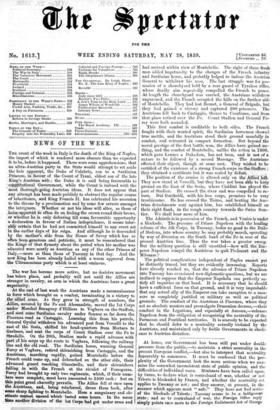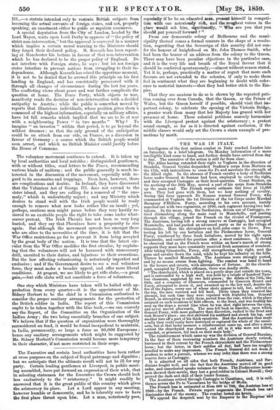At home, our Government has been still put under double
pressure from the public,—to maintain a strict neutrality in the present European conflict,—but also to interpret that neutrality .favourably to commerce. It must be confessed that the per- -plexity of the Government look the more serious when we exa- mine the somewhat inconsistent state of public opinion, and the difficulties of individual eases. Ministers have been called upon, by turns, to declare what is contraband of war, whether or not Trieste is blockaded by France, and whether the neutrality aot applies to Tuscany or not; and they answer, at present, in tho manner which appears most "safe." They have not had notice of the blockade of Trieste; Tuscany seems to be a belligerent state ; and as to contraband of war, the Foreign Office reply simply points once more to the Foreign Enlistment Act of George
III.,—a statute intended only to restrain British subjects from becoming the actual servants of foreign states, and not properly speaking, an enactment either to guide or regulate commerce.
A special deputation from the City of London, headed by the Lord Mayor, waits upon Lord Derby to approve of "the policy of strict non-intervention," but the approval is conveyed in a manner which implies a certain moral warning to the Ministers should they forget their declared policy. M. Kossuth has been repeat- ing at Manchester his lecture in favour of that non-intervention which he has declared to be the proper policy of England. Do not interfere with Foreign states, he says ; but let not foreign states interfere to prevent nations from struggling to their in- dependence. Although Kossuth has seized the opportune moment, it is not to be denied that he avowed this principle on his first landing in England, and has consistently persevered with it through all changes of circumstance during the last ten years. The conflicting views about peace and war further complicate the question at home. The Peace Party, which objects to war, manifestly reads the doctrine of non-intervention with a decided antipathy to Austria; while the public is somewhat moved by reports that illustrious individuals, whose position gives them a command of the highest information, especially on military affairs, have let fall remarks which implied that we are to be at war with a neighbouring Power "in two months" Why ? To imagine "an invasion" within that period, is to go beyond the wildest dreamer ; so that the only ground of the anticipation could be an attack from our side on France, as a diversion in favour of Germany ; a course which the British people would soon arrest, and which no British Minisier could justify before the House of Commons.



























